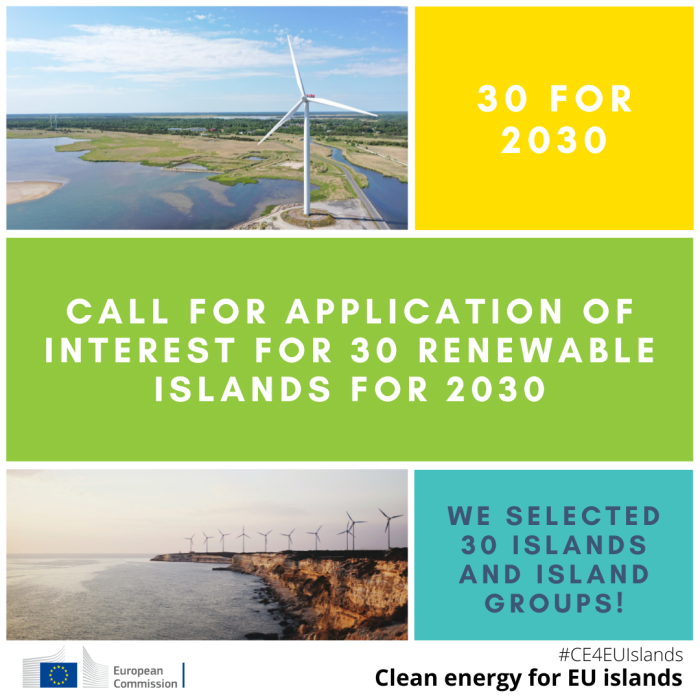30 renewable islands for 2030: discover the selected islands

The Clean Energy for EU Islands Initiative has concluded its Call for 30 renewable islands for 2030. The Secretariat is thrilled to share the selection of 30 islands and island groups from 10 European countries ready to lead the way towards a sustainable future.
The mission was clear: to identify and provide technical support to 30 islands and island groups over the next three years, propelling them towards complete energy independence through 100% renewable sources by 2030. The success of these exemplary islands will now become a beacon of guidance for others on their paths to comprehensive decarbonisation.
The Clean Energy for EU Islands Secretariat is stepping into action, ready to assist EU islands in devising, preparing, and implementing decarbonisation plans for their energy systems. It will extend technical and organisational support, ensuring each island receives comprehensive guidance throughout its journey.
Intensive assistance will be provided to our 30 pioneering islands and island groups, with active involvement from numerous follower islands.
The journey began with the Call for applications of interest launched by Kadri Simson – European Commissioner for Energy, European Commission on 8 June 2023 (Saaremaa, Estonia), and the secretariat is delighted to have received so many applications from islands eager to make a difference. After careful consideration, the EU islands secretariat has selected the 30 islands and island groups that will lead the way.
List of islands:
30 for 2030 finalists
| Country | Island and island groups |
| Croatia | Cres-Lošinj | Clean energy for EU islands (europa.eu) |
| Croatia | Island of Pašman |
| Croatia | Korčula | Clean energy for EU islands (europa.eu) |
| Denmark | Fejø |
| Denmark | Venø | Clean energy for EU islands (europa.eu) |
| Estonia | Saaremaa and Ruhnu (joined application) |
| Greece | Astypalea |
| Greece | Ikaria | Clean energy for EU islands (europa.eu) |
| Greece | Lesvos |
| Greece | Megisti (Kastellorizo) |
| Greece | Psara |
| Greece | Tilos | Clean energy for EU islands (europa.eu) |
| Ireland | Aran Islands | Clean energy for EU islands (europa.eu) |
| Ireland | Arranmore and Tory Island (joined application) |
| Ireland | Cape Clear | Clean energy for EU islands (europa.eu) |
| Ireland | West Cork islands and Inishbofin (joined application) |
| Italy | Arcipelago delle Isole Eolie and Salina e le isole di Lipari (joined application) |
| Italy | Giglio and Giannutri (joined application) |
| Italy | Pantelleria | Clean energy for EU islands (europa.eu) |
| Italy | San Pietro | Clean energy for EU islands (europa.eu) |
| Netherlands | Ameland | Clean energy for EU islands (europa.eu) |
| Netherlands | Saba, Bonaire and St. Eustatius (joined application) |
| Portugal | Madeira | Clean energy for EU islands (europa.eu) |
| Portugal | Pico, Faial and São Jorge (joined application) |
| Spain | Balearic Archipelago |
| Spain | Canary Islands – Isla de la Graciosa |
| Spain | Canary Islands – La Palma | Clean energy for EU islands (europa.eu) |
| Sweden | Gotland | Clean energy for EU islands (europa.eu) |
| Sweden | Holmön, Vinön, Visingsö and Hven (joined application) |
| Sweden | Öland |
Summary of core elements of technical assistance
In this comprehensive call for technical assistance, diverse topics ranging from renewable energy production to storage and grid optimisation are addressed across the above-mentioned islands. The successful call of the “Renewable Islands for 2030” initiative involved the identification of 30 islands and island groups aimed to lead in achieving complete energy independence through 100% renewable sources until 2030.
Plans will be developed for financing energy efficiency measures, exploring analysing and implementing renewable energy generation projects. This is coinciding with the objectives ot the RePower EU Initiative.
Studies will include the analysis of business models, community involvement in solar power, hydropower, and various energy storage options. Further, the scope extends to wind energy development, electrification of transport, grid flexibility, and self-consumption.
The technical support will also delve into sustainable marine transport, waste management and valorisation, and district heating optimisation.
The overarching goal is to drive a holistic transition towards sustainable energy practices, encompassing both technological advancements and community engagement across diverse regions and energy domains.
Sources
- Original article by Clean energy for EU islands
- EU Commission Press Release
